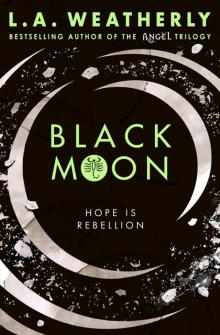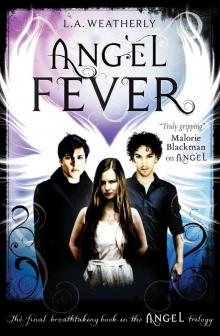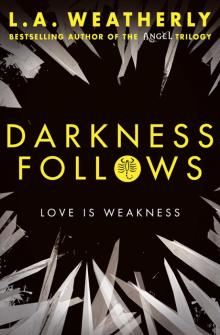- Home
- L. A. Weatherly
Angel Fire Page 34
Angel Fire Read online
Page 34
Page 34
No one said anything as he put them back to work, but it was like a ripple of determination had passed through the group; like they all suddenly got it. He kept everyone practising for hours each day, and when they weren’t doing that, he made sure they were working out, keeping in shape. He discussed strategy with the team too, drilling it into them – like, what to do when you’re under direct attack, so you don’t lead the angels straight back to your doorstep.
He was an excellent teacher – patient and good at explaining things – but I could tell he never forgot that in just over ten weeks, he had to have everyone trained for what might be humanity’s only real chance against the angels. Though he never even hinted to the others that he had reservations about being in charge, I knew how heavily the responsibility weighed on him. It showed in his face, his eyes, making him look so much older than eighteen that it wrung my heart. And while I’d never met his father, as I watched Alex explaining diagrams at the kitchen table with everyone crowded around him, I somehow knew he was his dad all over again.
The TV showed that the world had changed already. Before, it was possible to go a day or two without hearing a reference to the angels. Not any more. Almost every time you changed the channel, you got a talk show where los ángeles were being discussed, or a documentary about true-life angelic stories, or a music video with everyone bopping around in angel wings. We got CNN and a few other American channels on cable, and it was exactly the same in the US. There were new TV shows galore: Who’s The Angel?, Angelic Paths, Angels 1-2-3. They all looked sort of cheesy and rapidly thrown together, but were obviously meeting a huge demand; everyone wanted to drown themselves in images of their predators. On the news, random street shots always showed people wearing angel wings: a new fad meaning you’d seen an angel. The camera often caught someone gazing dreamily into the distance too, basking in the glow of a beautiful creature only they could see.
With all that, it wasn’t surprising the problem of overcrowded hospitals was getting worse. I remembered the documentary I’d seen back in Tennessee: the beds lining the hospital corridors; the teenage girl with exhausted, angel-burned eyes. That was only a couple of months ago, and now those images seemed practically upbeat. In both the US and Mexico, people were literally dying on hospital floors. You sometimes couldn’t even get an ambulance now, or find a hospital that could take you in. Protests were springing up all over, with people demanding that the government do something. Here in Mexico City, things were even worse, because renovating the cathedral to become part of the Church of Angels had been paid for with taxpayers’ money. Most people were all for it, but a group calling themselves the Crusaders for People’s Rights were furious that the funds hadn’t been used for medical care. Protests here were turning into sizzling confrontations, with the “Crusaders” and the “Faithful” screaming at each other on a regular basis.
We saw Raziel once on TV too.
He was in his human form, walking through the Denver cathedral – apparently pointing out the damage, though the commentary was in Spanish. I sat stiffly on the battered sofa, unable to take my eyes away – and was so, so glad that nobody except Alex knew this was my father.
“That jerk,” muttered Kara. Often she was out with Luis in the evenings, trying to get information, but she was home for a change – perched cross-legged in the armchair, painting her toenails. “You know, I hate all the angels, but that one is really something else. I want to throw stuff at the screen whenever I see him. ”
“Yeah, you’re not the only one,” said Alex, beside me on the sofa. He took my hand, squeezing it as the camera panned around the cathedral. There was scaffolding up, and dozens of workers busy repairing the buckled floor and collapsed section of ceiling. I stared at the spot where I’d crouched less than two weeks before, my muscles clenching as I remembered what it had felt like to die.
Raziel appeared again. Jet-black hair; a refined, sensitive face. And long, slender hands that had buried themselves deep in my mother’s energy field when she was only a twenty-year-old music student at NYU. As he spoke, Spanish subtitles scrolled across the bottom of the screen. “Yes, repairs are almost finished now,” he said. “We’re looking forward to getting back to business as usual, and putting all of this behind us. ”
“And you, sir, you claim you’re an angel yourself?”
Raziel gave a small, wise smile directly to the camera. An almost-dimple appeared in one cheek; his eyebrows arched good-humouredly. “It’s not a claim, it’s the simple truth. My kind are now living amongst you, to bring hope in these troubled times. ”
Hatred twisted in my stomach. He sure hadn’t brought hope to my mother.
“Will the world see any changes now that more angels have arrived?” asked the reporter. “For instance, will the Church of Angels remain the same?”
Raziel’s benign expression vanished as his brown eyes narrowed – and all at once I was looking at the same deadly angel Alex and I had confronted in the cathedral. “No,” he said. “There will be no changes to the Church. ” His smile returned, almost as pleasant as before, though this time I could see the calculation under it. “No changes at all,” he repeated deliberately. “That is my promise. ”
I held back a shudder. For a weird second, it had felt as if he was looking right at me, as if he could actually see me through the screen somehow. As usual now, that slight sense of my angel shifting within me was there, and I tried to push it away, suddenly sickly aware of how not human I was – with this thing inside me and Raziel for a dad. I’d thought all of this was something I’d gotten used to. It so wasn’t.
At least the manhunt for us seemed to have calmed down, though our pictures still flashed on the screen occasionally. I stared at my photo whenever it appeared, wondering who that blonde girl with the bright smile was. Kara always teased Alex about the terrible drawing that made him look like an aging football player – and whenever he managed to unwind a little he teased her too, with stories from their life back at the old camp. I could see the real affection between them, but it seemed so totally brother/sister on both sides that I thought I must have been insane to have imagined how soft and shining Kara’s eyes had become as she watched him that day.
Except I didn’t really believe I was.
After what Alex had told them, none of the AKs gave me a hard time – but none of them spoke to me much either. And this was not exactly a quiet group. They were always talking, arguing, bantering. Brendan was from Portland and like a terrier, all wiry hair and hyper energy. The only thing he and Sam agreed on was the need to rid the world of angels; they’d bicker about politics for hours, with Brendan clawing at his head and practically shrieking with frustration – “Man, how can you think that? Are you even listening to how ignorant you sound?”
Eventually Trish would step in and try to defuse things in her gentle way. Everyone liked her so much that Brendan might subside for a while, grumbling, and then Sam would make another drawling comment and they’d be off again. Liz was just as bad, dropping biting little remarks into the conversation and goading things along.
She was also the self-designated cook, which was something I loved to do too – but when I’d suggested that maybe we could take turns, she’d stiffened as if I planned to sprinkle poison in the food. So I dropped it. It wasn’t worth it. Even with the others, “prickly” seemed to be Liz’s default setting, though she and Trish got along really well. Once I walked into the girls’ dorm to find them talking earnestly together. “I don’t think you should blame yourself,” Trish was saying. “Everyone’s family has issues. ”

 Watcher
Watcher Black Moon
Black Moon Angel
Angel Angel Fire
Angel Fire Broken Sky
Broken Sky Angel Fever
Angel Fever Them
Them Darkness Follows
Darkness Follows Angel 2 - Burn
Angel 2 - Burn Angel Burn
Angel Burn